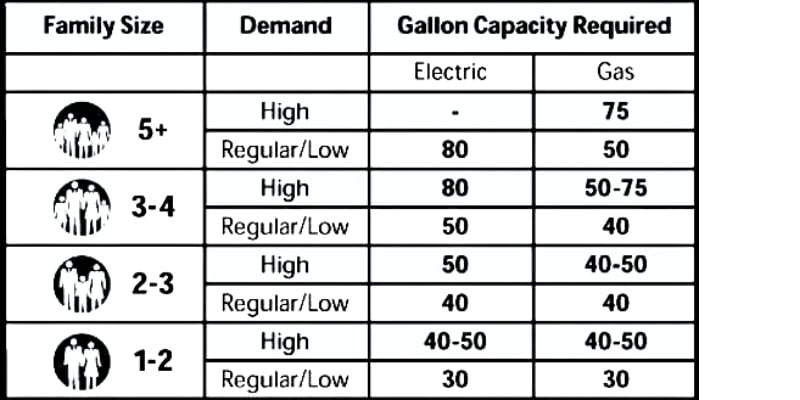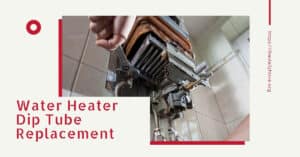Are you looking for a water heater sizing guide? Sizing a water heater to fit your needs is not hard to do. Understanding the right balance is key—you do not want to heat a lot of water you won’t use, as it’s an unnecessary expense and waste of energy. On the other hand, you want to be sure that you have enough hot water for you and your family, ensuring comfort and convenience.
Have you ever stood in a cold shower because someone in the house used up all the hot water? It clearly indicates that your water heater is not up to the task. Choosing the right water heater size is essential for your comfort, energy efficiency, and cost-effectiveness.
Using the chart below as a guide, estimate the hot water your family would use in any hour (peak demand). Most families use a significant amount of hot water in the evenings after work and school. This is the time when various needs such as cooking, dishwashing, clothes washing, showers, and baths typically occur. Here’s a simple breakdown of average hot water consumption for various activities:
Average gallons of hot water per use:
- Cooking – 5 gallons
- Hand dishwashing – 6 gallons
- Automatic Dishwasher – 15 gallons
- Shower or Bath – 20 gallons
- Clothes Washer – 30 gallons
Consider any additional activities not listed above that require hot water and that you tend to perform during peak hours. By effectively calculating your peak demand, you’ll have a more accurate idea of your home’s suitable water heater size.
Factors Affecting Water Heater Size
Many factors come into play when determining your home’s appropriate water heater size.
- Household size – The number of people residing in your home significantly influences your hot water needs.
- Water usage habits: – Do you take long, hot showers or short, lukewarm ones? Your habits dictate your needs.
- Peak hour demand – Identify when hot water demand in your home peaks. Is it in the morning when everyone is getting ready? Understanding this helps in selecting the right unit.
The Formula for Size Calculation
The number of people residing in your home significantly influences your hot water needs. You can estimate the necessary tank capacity (in gallons) based on the number of people in the house:
- 1 or 2 people—20 to 35 gallons
- 2 to 4 people—30 to 45 gallons
- 3 to 5 people—45 to 55 gallons
- 5 or more people—over 55 gallons (add 10 gallons per additional person)

For instance, the average family of four would typically require a 40-gallon water heater. This capacity should cover daily hot water activities such as showers, dishwashing, and laundry.
However, the total number of household members shouldn’t be your only consideration. It’s an excellent place to start, but there’s more to determining the appropriate water heater size than household size alone.
Understanding this detailed breakdown helps in selecting a water heater that meets your hot water demands and optimizes energy usage, ensuring that you’re not paying extra for heating water that you won’t use.
Types of Water Heaters and Size Guide
Choosing the right water heater for your home means considering more than just your family’s water usage; it’s also essential to understand the different kinds of water heaters available. Different heaters serve different purposes, and knowing which suits your home’s needs is half the battle.
Tank Water Heaters
Traditional tank water heaters are still prevalent in many homes today. These water heaters continuously store and heat water, ensuring that hot water is always ready. When considering a tank water heater, one of the critical factors is the tank’s size.
Example: If your family consists of four members who use water for showers, washing dishes, and laundry simultaneously, especially during peak hours, you may need a tank with a capacity of 40-50 gallons, depending on specific water usage habits. However, if your family’s usage exceeds typical consumption—for instance, multiple bathrooms used simultaneously or extra loads of laundry—you might need to consider a larger tank of up to 75 gallons.
Tankless Water Heaters
Tankless water heaters, known for their energy efficiency, are gaining popularity. They provide hot water on demand by heating water directly without needing a storage tank. When a hot water tap is turned on, cold water travels through a pipe into the unit, and either a gas burner or an electric element heats the water.
Sizing for tankless water heaters calculates how much water your household needs during peak times and the temperature rise required at that flow rate. Therefore, you must consider the number of water fixtures you plan to use simultaneously.
Example: If your household tends to have a shower, a washing machine, and a kitchen sink running hot water simultaneously, you’ll need to add up the flow rates (gallons per minute) of these fixtures. If the combined flow rate is 5 gallons per minute and you need the water to be heated by 60 degrees Fahrenheit, you’ll need a tankless water heater to meet these specifications.
Hybrid Water Heaters
Hybrid water heaters, or heat pump water heaters, have been introduced as a modern solution combining the conventional tank storage style with the energy efficiency of heat pumps. They pull heat from the surrounding air to heat the water. This method is more energy-efficient than traditional heating elements.
Sizing a hybrid water heater involves understanding your peak hour demands, just like a traditional tank system, but with the added consideration of the environment in which it will operate. Because it uses heat from the air, the space’s temperature where it’s installed can affect performance.
Example: If you’re a family of four living in a moderate climate, a 50-gallon hybrid water heater could be efficient. However, suppose the heater is placed in a cold basement. You might need a larger tank or supplemental heating (like a tank booster) to meet your hot water demands, especially during winter.
Benefits of Choosing the Appropriate Size Water Heater
Opting for the right water heater size is not merely about meeting your daily hot water needs; it brings several advantages that might not be immediately apparent but have long-term impacts on efficiency, cost savings, and equipment longevity.
Efficiency and Costs
The first clear benefit of selecting a water heater that matches your household demand is energy efficiency, which translates into cost savings. An oversized unit means you’re heating more water than you need. This process inevitably leads to energy wastage and higher utility bills. This “standby” energy loss is like leaving your car running all day so it’s ready to drive when needed.
On the other hand, a unit that’s too small is equally problematic. It may constantly be running to catch up with your hot water needs, especially during peak times, which can also spike your energy costs and result in an inability to provide consistent hot water.
For example, imagine choosing a high-capacity tank when your usage only requires half of the tank’s capacity. This scenario means you effectively pay double each time you heat water because the unit maintains the temperature of twice the water you regularly use. By choosing a water heater that aligns with your actual consumption, you avoid unnecessary costs on your monthly utility bills, saving money in the long run.
Longevity and Performance
When a water heater is correctly sized, it also operates under optimal conditions, contributing to its lifespan and performance. A system constantly overworking because it’s too small can undergo wear and tear much quicker, resulting in frequent maintenance issues and a shortened lifespan.
Conversely, a water heater that’s too large for your needs might not only lead to energy inefficiency but could also face issues due to long periods of water stagnation, potentially impacting water quality and causing component corrosion.
Furthermore, the strain on a water heater that’s continuously running or heating more water than needed can lead to faster degradation of critical components. This strain is not just a maintenance concern but can also become a comfort issue. Overworking the unit can lead to inconsistent water temperatures, disrupting your daily routines, especially in the chilly mornings when a warm shower is a day starter.
For instance, a smaller household with a large tank might experience sediment buildup due to infrequent water use, leading to maintenance hassles and potential health concerns. In contrast, a larger family using a small heater might find the system failing prematurely, unable to keep up with the high demand.
Potential Issues with Incorrect Sizes of Water Heaters
Selecting the wrong size for your water heater can lead to many problems, affecting your comfort, wallet, and appliance’s longevity. Here’s what could go wrong if you don’t size your water heater correctly:
Oversizing
When you choose a water heater that’s too large for your needs, the immediate impact is felt in your finances. Larger units come with heftier price tags, and the expenses don’t stop after purchase. These water heaters require more energy to maintain the temperature of a larger volume of water, leading to increased energy consumption.
But why is maintaining a larger volume of hot water a problem? Think of it as heating a large room with nobody in it. You’re essentially paying for wasted space. This inefficiency becomes a recurring feature on your monthly utility bills as the unit consumes more energy, even during periods of low usage.
Moreover, the environmental impact shouldn’t be overlooked. Increased energy consumption contributes to higher carbon emissions, making the oversized water heater an eco-friendly option.
Undersized
In contrast, a water heater that’s too small presents a different set of challenges. The most immediate is the lack of sufficient hot water. Imagine the discomfort of a cold shower in the middle of winter because your water heater couldn’t meet the demand. This scenario could be a daily inconvenience, disrupting routines and causing frustration.
Beyond the discomfort, there’s also a mechanical toll. A water heater constantly running to meet excessive demand is under stress. The constant strain on the system can lead to faster degradation of components, necessitating more frequent repairs and potentially shortening the unit’s life. This wear and tear is like continuously revving a car’s engine; it inevitably leads to breakdowns.
Moreover, in trying to catch up with your hot water needs, an undersized unit may consume excess energy during peak times, spiking your utility bills unexpectedly. It’s a misconception that smaller units will always save money in the long run, as they might run more frequently and less efficiently.
Conclusion
By understanding these pitfalls, homeowners can appreciate the importance of choosing the right-sized water heater. It’s not just a matter of hot water; it’s about cost-effectiveness, energy efficiency, and system durability. Whether it’s the unnecessary expenses of an oversized unit or the constant struggles and inefficiencies of an undersized one, getting it wrong can have enduring repercussions. The key is to find that “just right” fit for your home’s unique needs, ensuring comfort, reliability, and peace of mind.
Choose wisely, and you’ll enjoy the comfort, efficiency, and savings the ideal water heater brings.






